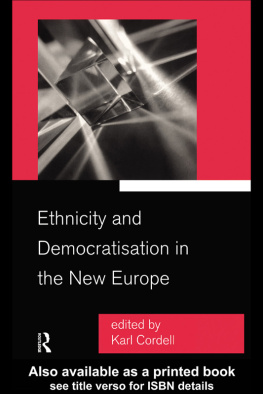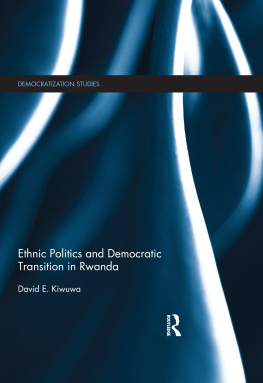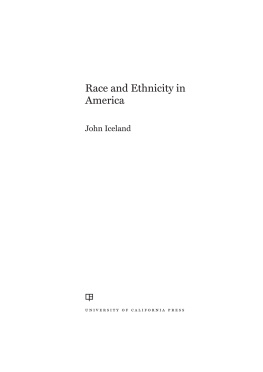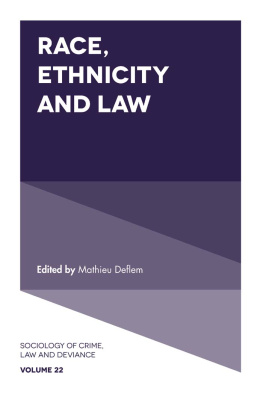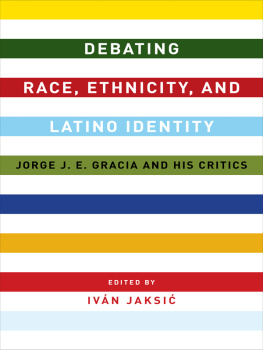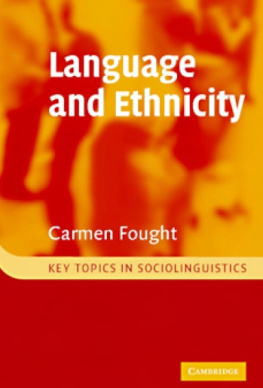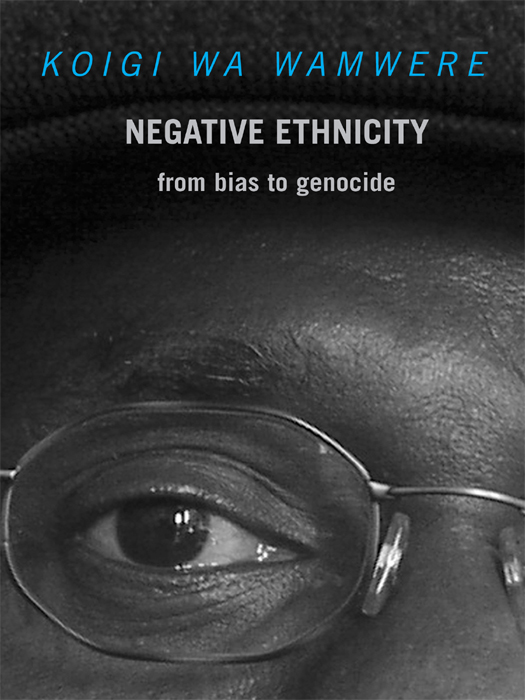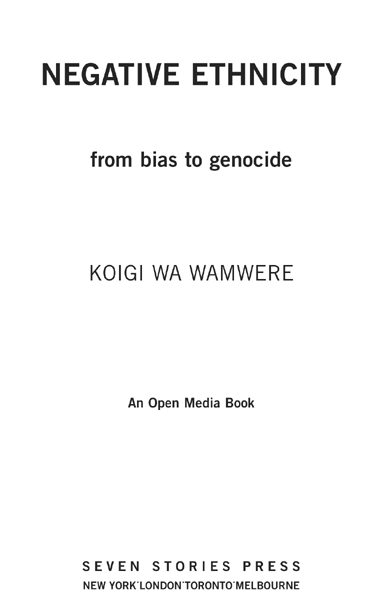Copyright 2003 by Koigi wa Wamwere
A Seven Stories Press First Edition. An Open Media Book.
All rights reserved. No part of this book may be reproduced, stored in a retrieval system, or transmitted in any form, by any means, including mechanical, electric, photocopying, recording or otherwise, without the prior written permission of the publisher.
Seven Stories Press
140 Watts Street
New York, NY 10013
www.sevenstories.com
In Canada:
Hushion House, 36 Northline Road, Toronto, Ontario M4B 3E2
In the U.K.:
Turnaround Publisher Services Ltd., Unit 3, Olympia Trading Estate, Coburg
Road, Wood Green, London N22 6TZ
In Australia:
Palgrave Macmillan, 627 Chapel Street, South Yarra VIC 3141
eISBN: 978-1-60980-268-4
College professors may order examination copies of Seven Stories Press titles for a free six-month trial period. To order, visit www.sevenstories.com/textbook, or fax on school letterhead to (212) 226-1411.
Cover design: Greg Ruggiero
Cover photo: Koigi wa Wamwere, October 2002. Greg Ruggiero
v3.1
contents
Editors Note
Negative Ethnicity was written and edited prior to the unprecedented open elections in Kenya in December 2002, when Koigi wa Wamwere was elected Member of Parliament from the Nakuru district. The text, with its analysis of Kenyan political life, including references to Mwai Kibaki, the new president of Kenya, and dated references to the lapsed dictatorship of Daniel arap Moi, has been preserved as it was written. The postscript was added in January, 2003.
Introduction
The Lost Lessons of Africa
I am down, and around me a big fire rages. Our village is razed and destroyed. There are screams everywhere. People are running away but most, like me, cannot. They are hurt and down. I inhale smoke and smell burning flesh, food, and timber everywhere. I see a man coming with a flaming torch for burning houses and food stores, a spear to stab my heart and a sword to slit my throat and kill me as they have others. I think it is the end, but not yet.
Please, dont kill me, I plead with whatever breath I have left. We are Africans. We are brothers.
Without looking at me, he thrusts the spear into my side and cuts my throat. Die, die, you dirty louse, he says. I am not your brother. I am not your tribe.
Tasting blood in my mouth, I slide into unconsciousness with that word ringingtribe, tribeuntil the world falls silent.
When I wake up, I am in the hospital, wrapped in bandages from head to foot. A Good Samaritan picked me up and brought me here.
Several months later, I go to my village but it is no more. When I look where my house stood, there is another on the land that is no longer mine. Both the new house and the land now belong to him who tried to kill me. Because I am from another ethnic community I am evicted from my home and land and cleansed from the Rift Valley Province where anyone who is not Kalenjin is called a foreigner. I cry and ask, Why? No one answers.
John Mwangi of Rare farm in the Nakuru district of Kenya gave this account in 1998. Four years earlier, in Rwanda, ethnic hatred killed one million men, women, and children in a genocide that took only three short months to execute. Africa and the world were horrified, but the lesson of this tragedy, as so many others in Africa, was soon lost. In Africa, ethnic hatred continues to kill.
But ethnic hatred, this negative form of ethnicity, did not begin to kill African people yesterday. Since independence in the 1960s, at least five million Africans have died from civil war and strife they have created among themselves. Before the 1994 genocide in Rwanda, horrible massacres and genocides, many still in progress, were never acknowledged or have since been forgotten. For instance:
In Sudan, civil war has killed two million people since 1983.
In Nigeria, in September, 1996, 10,000 to 30,000 Ibo people were massacred in the northern region and one million fled as refugees to the Ibo-dominated east. Non-Ibos were expelled from the eastern region.
By the time the Biafran war with Nigeria ended in 1967, two million people in the eastern region had died from war and related starvation and disease.
In Uganda, dictators Idi Amin, Obote, and Okello killed approximately 800,000 people between 1966 and 1986 for belonging to the wrong ethnic community and other cultural differences.
In Burundi, beginning in April, 1972, 200,000 majority Hutus were killed when minority Tutsis decided to eliminate all educated Hutus; and since 1993, a nine-year civil war has killed another 200,000 people.
In Liberia, a civil war that broke out in 1989 killed 150,000 people and drove 1.1 million into exile out of a population of three million.
In Angola, the civil war that began in 1975 and ended in 2002 killed one million people and created four million refugees.
In Somalia an ongoing civil war that began in 1991 has killed more than a million people.
In Algeria, civil war has killed over 100,000 people since 1992.
In the Democratic Republic of Congo, a four-year war involving Uganda, Rwanda, Angola, Chad, Namibia, and Zimbabwe has killed 2.5 million people.
In Sierra Leone, more than 50,000 people have been killed and more than one million forced into exile in a ten-year civil war that started in 1991 and only recently ended.
In South Africa, 20,000 black South Africans were killed in ethnic violence between 1985 and 1994 elections.
Researching the figures for the millions who have died as a result of negative ethnicity in Africa, I was often reminded of the atomic bomb. When it was dropped on Hiroshima on August 6, 1945, it killed 100,000 people. When it was dropped on Nagasaki three days later, it killed 40,000 people. Nuclear weapons are feared today because of these massive death numbers. Yet Africa, which has no nuclear bombs and has never suffered a nuclear attack, has created its own weapon of mass destruction, one more powerful than the atomic, hydrogen, or neutron bombs: negative ethnicity. With it, Africa has killed, and continues to kill, millions of its own men, women, and children. While other nations develop bombs for self-defense, Africas bomb of negative ethnicity is of its own making and blindly targeted at self-destruction.
Africa is fast dying. As I write, AIDS has killed eighteen million of us, and is killing 750 persons every day in Kenya alone. While Africans may not yet have the medical know-how to stop the AIDS holocaust, why not do something to stop the holocaust of negative ethnicity?
Rational people ought to avoid anything that kills them. As the Kenyan Gikuyu proverb goes, hiti ndiheagwo keriOne does not give a human being to a hyena twice. So why do we continue to give millions to the hyena of negative ethnicity?
Another Gikuyu proverb runs, gutiri wirutaga na rwa ungiNobody learns from the pain of another. Yet the fire of negative ethnicity has burned Africans not once, not twice, but many times, and for a very long time. Why have Africans not learned from their own pain?
It makes me sad to see the government of Kenya playing with ethnic demonization, discrimination, war-mongering, and ethnic cleansing, as if Africa has not suffered enough genocides already. It makes me angry to see opposition politicians increasing their political support and negotiating power by fanning ethnic bias, suspicions, and fears, as if commission of the same crime by those in power is not enough. With African leaders turned into tribal chiefs and warlords, negative ethnicity has become an inescapable prison and grave for African people. It makes me nervous to see journalists, priests, academics, and most of our intellectuals who, rather than educate their communities in human equality, acceptance of others, and the interdependence of all, beat the drums of negative ethnicity on the march to elite privileges.


